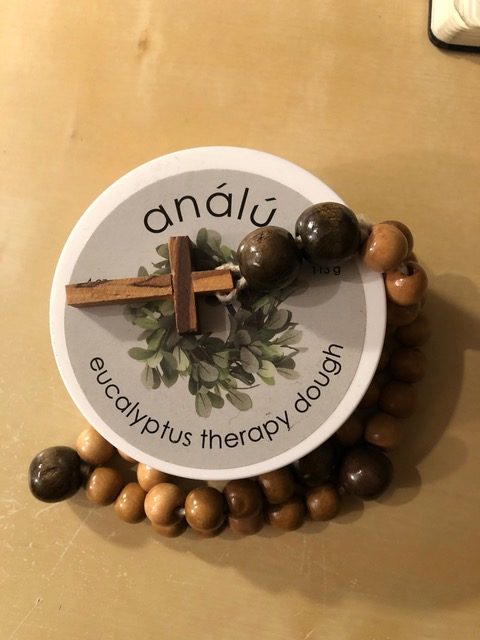You stay grounded and steady in that bond of trust, constantly tuned in to the Message, careful not to be distracted or diverted. (Colossians 1:23, The Message)
For Christmas last year, Emily McGinley (Urban Village’s Executive Pastor) gave everyone on staff something called “análú,” which is, as the package notes, “eucalyptus therapy dough.” The label continues: “Pure essential oil and vegetable pigments are combined to create a calming, fragrant tactile experience.” Emily intuited that in the midst of all of our experiences with Zoom, we might need something tactile to keep our brains from fogging too densely. I wasn’t quite sure if I needed it, but as I reflected on how tempting it is to click around on various web sites while on a large Zoom call, not only have I used this therapy dough, but I have also placed other tactile helps near my laptop (like a set of prayer beads I made several years ago) to keep me focused.
We’ve likely all read numerous articles about our society’s shrinking attention spans and, of course, the pandemic has made it even harder to focus. That can make prayer an even bigger challenge. My mind can jump all over the place, from lamenting what is happening to Haiti and Afghanistan to rehashing the show I watched last night.
What’s why I was grateful for this excerpt I read a few weeks ago. It’s from the book “Soul Feast” by Marjorie Thompson: “In a very real sense, then, the foundation of all prayer is being present to the presence of God. Quaker writer and teacher Douglas Steere speaks of ‘being present where we are’ and ‘not too elsewhere.'”
Not too elsewhere. Those were the words I needed. When my attention flits around like a butterfly when I’m in prayer, I sometimes think, “Good grief. I’m a pastor. I’ve done this my whole life. I should be able to focus.” But speaking those words to myself isn’t helpful. The words from Douglas Steere–that we should not be too elsewhere–have grace embedded them. He doesn’t say that we must not be elsewhere. He says that perhaps we shouldn’t be too elsewhere. It acknowledges that life happens. That the world hurts. That our minds get distracted. It’s unrealistic to think that we will be always 100 percent focused whenever we try to stop and be present with God.
Don’t be too hard on yourself if you can’t focus. Knead some therapy dough if that helps. Rub some prayer beads. And trust that wherever that elsewhere is that your mind goes, God is there, too.

